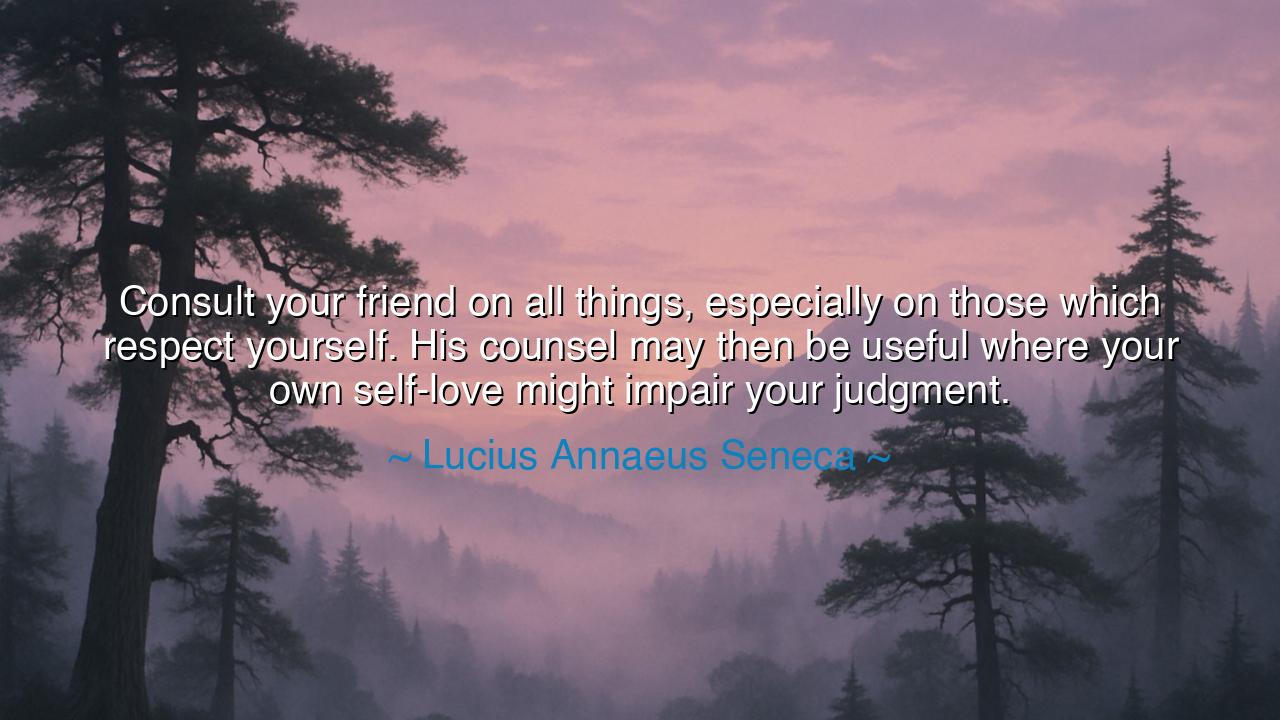
Consult your friend on all things, especially on those which
Consult your friend on all things, especially on those which respect yourself. His counsel may then be useful where your own self-love might impair your judgment.






The words of Lucius Annaeus Seneca—“Consult your friend on all things, especially on those which respect yourself. His counsel may then be useful where your own self-love might impair your judgment.”—are carved from the stone of timeless wisdom. In them, the great Stoic philosopher reminds us of one of life’s deepest truths: that man is often blind when it comes to himself. Pride, passion, and the subtle whisper of self-love can cloud the mind, making even the wisest err in decisions that concern their own life. Thus, Seneca commands us to turn to the counsel of a true friend, whose eyes, unclouded by vanity, may see with clarity what we cannot.
The ancients understood well that friendship was not a mere bond of affection, but a partnership in virtue. Aristotle himself declared that the truest friend is “another self,” a mirror in which one may see one’s faults and strengths reflected. Seneca follows in this tradition, teaching that a trusted companion is not simply one who comforts, but one who guides, warns, and advises. Especially in matters of the self, where judgment falters, a friend’s perspective may be the very anchor that prevents a soul from drifting into ruin.
History offers us a luminous example in the bond between Alexander the Great and his companion, Hephaestion. Though Alexander conquered nations, he did not disdain the counsel of his friend. In moments of pride or anger, Hephaestion could speak with honesty, and Alexander, though a king, listened. It was not weakness to heed another’s voice; it was wisdom, for he knew that his own self-love might cloud his choices. The greatness of Alexander lay not only in his conquests, but in his willingness to consult those closest to him.
The emotional force of Seneca’s teaching lies in its humility. Many resist advice, thinking it diminishes their strength. But to seek counsel is not weakness—it is strength of a higher order. It is the recognition that the mind, like the eye, cannot see itself clearly without a mirror. A true friend becomes this mirror, reflecting with honesty what our pride conceals. To reject such counsel is to walk willingly into the snares of folly; to embrace it is to walk the path of wisdom.
Yet Seneca also warns us implicitly to choose our friends with care. For only the counsel of a virtuous friend is worthy of trust. The flattery of false companions is more dangerous than silence, for it feeds our self-love and deepens our blindness. Thus, the teaching is twofold: seek the advice of a true friend, and ensure that your friend is one who values truth above comfort. For only such a friend can save you from yourself.
The lesson for us is clear: in our lives, let us not be ruled by the pride of solitary judgment. In decisions of weight, especially those clouded by desire, anger, or ambition, let us seek the voice of a trusted companion. Practically, this means cultivating friendships founded on honesty and virtue, where both may speak freely without fear. It means humbling ourselves to listen when their counsel differs from our own, knowing that in their clarity we may find salvation from our errors.
Thus, Seneca’s words endure as a guiding flame for all generations: do not trust wholly your own judgment in matters of the self, for pride blinds even the wise. Seek instead the counsel of a friend, who sees what you cannot, and who, by truth spoken in love, preserves your soul from folly. To live in such friendship is to live wisely, and to live wisely is to live well.






AAdministratorAdministrator
Welcome, honored guests. Please leave a comment, we will respond soon